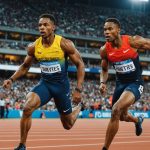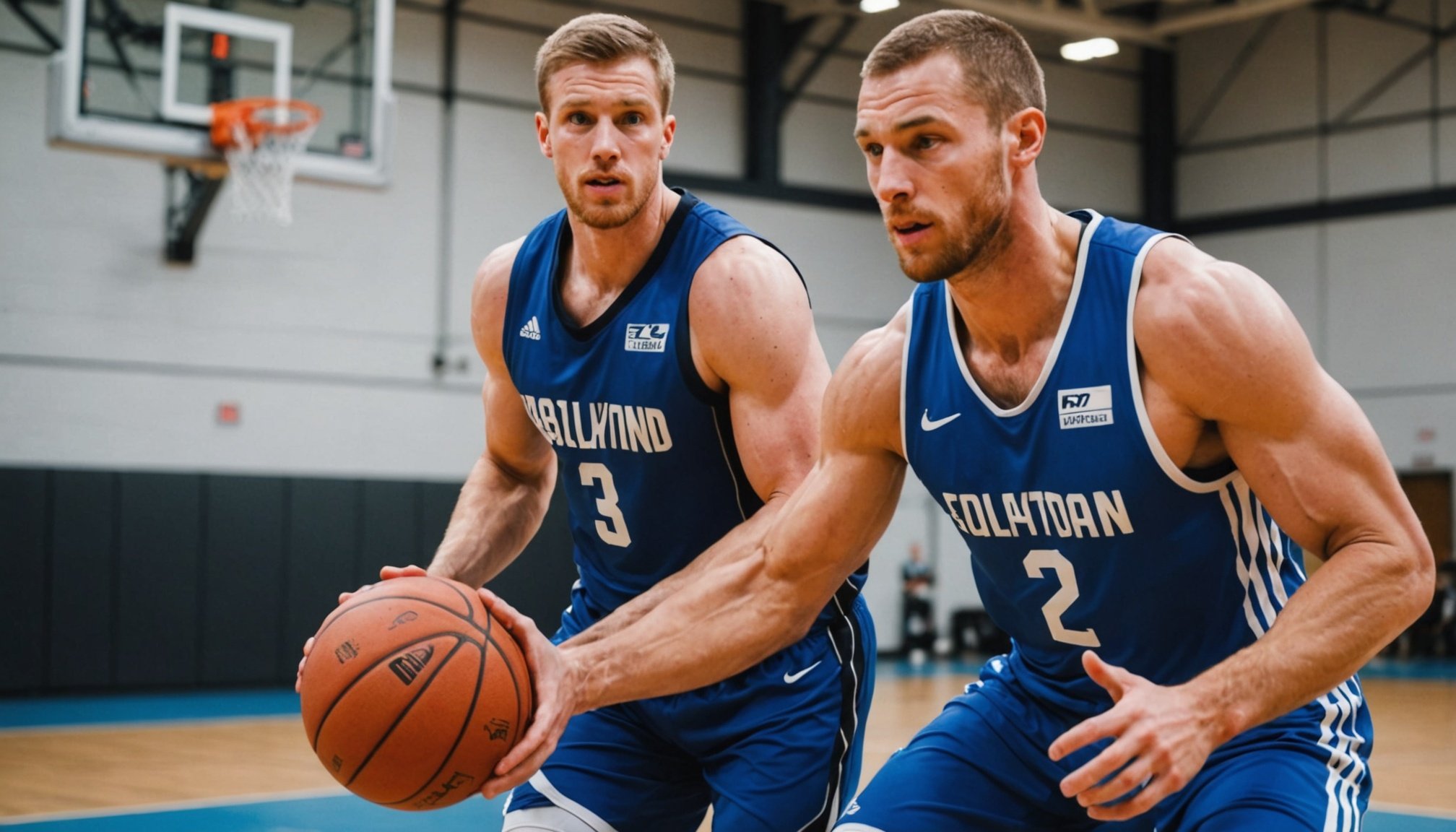Top Dietary Strategies for UK Basketball Forwards to Boost Muscle Mass Effectively
For UK basketball forwards, building and maintaining muscle mass is crucial for enhancing performance on the court. A well-structured dietary plan, combined with effective training and recovery strategies, can make all the difference. Here’s a comprehensive guide on the top dietary strategies to help basketball players achieve their muscle mass goals.
Understanding the Importance of Nutrition in Basketball
Nutrition plays a pivotal role in the performance and recovery of basketball players. A balanced diet provides the necessary fuel for high-intensity training and games, while also supporting muscle growth and repair.
This might interest you : Elevating On-Court Leadership: Strategies for UK Basketball Point Guards to Enhance Communication Skills
“Nutrition is not just about eating to survive; it’s about fueling your body to perform at its best,” says Chris Paul, a 12-time NBA All-Star who has seen significant improvements in his energy levels since adopting a plant-based diet.
Protein Intake: The Cornerstone of Muscle Mass
Protein is essential for muscle protein synthesis, which is the process by which your body builds new muscle tissue. Here are some key points to consider:
Also read : Boosting Performance: Essential Hydration Strategies for UK Basketball Players
Daily Protein Requirements
- Basketball players need a higher protein intake compared to the general population. Aim for 1.6-2.2 grams of protein per kilogram of body weight daily.
Timing of Protein Intake
- Consuming protein immediately after exercise, particularly resistance exercise, can enhance muscle protein synthesis. Aim for 20-30 grams of protein within 30-60 minutes post-exercise.
Sources of Protein
- Include a variety of protein sources in your diet, such as lean meats, fish, eggs, dairy, legumes, and plant-based options like tofu and tempeh.
- For plant-based athletes, combining different plant proteins (e.g., beans and rice) can ensure all essential amino acids are met.
Example Protein Sources and Their Amino Acid Profiles
| Protein Source | Protein Content (per serving) | Essential Amino Acids |
|---|---|---|
| Chicken Breast | 30 grams (3 oz serving) | Complete amino acid profile |
| Salmon | 20 grams (3 oz serving) | Complete amino acid profile |
| Lentils | 18 grams (1 cup cooked) | Incomplete (combine with rice or whole grains) |
| Tofu | 20 grams (3 oz serving) | Incomplete (combine with other plant proteins) |
| Whey Protein | 25 grams (1 scoop) | Complete amino acid profile |
Carbohydrates and Energy Needs
Carbohydrates are the primary source of energy for high-intensity activities like basketball. Here’s how to optimize your carbohydrate intake:
Daily Carbohydrate Requirements
- Aim for 2-3 grams of carbohydrates per kilogram of body weight daily. This can be adjusted based on the intensity and duration of your training sessions.
Types of Carbohydrates
- Focus on complex carbohydrates such as whole grains, fruits, and vegetables. These provide sustained energy and essential nutrients.
- Include simple carbohydrates like sports drinks or energy gels during and after intense workouts to replenish glycogen stores quickly.
Healthy Fats and Their Role
Healthy fats are crucial for hormone production and the absorption of vitamins. Here are some key points:
Sources of Healthy Fats
- Include sources like nuts, seeds, avocados, and olive oil in your diet.
- Fatty fish like salmon are also rich in healthy fats and provide additional protein.
Hydration and Recovery
Proper hydration and recovery strategies are as important as the diet itself.
Hydration Management
- Aim to drink at least 8-10 glasses of water per day. During intense training, monitor urine color to ensure it remains pale yellow, indicating adequate hydration.
Post-Exercise Recovery
- After a game or intense training session, consume a balanced meal or snack that includes protein, carbohydrates, and healthy fats within 30-60 minutes. This helps in muscle recovery and replenishes energy stores.
- Consider dietary supplements like protein shakes or recovery drinks if a full meal is not immediately available. However, always prioritize whole foods over supplements.
Plant-Based Diets for Basketball Players
Several NBA players have successfully adopted plant-based diets, which can be highly effective for athletes.
Benefits of Plant-Based Diets
- Plant-based diets can provide all necessary nutrients for muscle growth and recovery when planned correctly.
- “Following a plant-based diet has led to an enormous improvement in my performance as an athlete,” says JaVale McGee, who credits his diet for his enhanced performance on the court.
Key Plant-Based Foods
- Legumes (lentils, beans, chickpeas)
- Whole grains (quinoa, brown rice, whole wheat)
- Nuts and seeds (almonds, chia seeds, hemp seeds)
- Plant-based protein powders (pea protein, hemp protein)
Practical Tips for Implementing These Strategies
Here are some practical tips to help you implement these dietary strategies effectively:
Meal Planning
- Plan your meals in advance to ensure you are meeting your nutritional needs.
- Use a meal planning app or consult with a sports dietitian to create a personalized plan.
Snacking
- Keep healthy snacks like nuts, fruits, and energy bars handy to maintain energy levels throughout the day.
- Avoid sugary and processed snacks that can lead to energy crashes.
Supplementation
- While whole foods should be the primary source of nutrition, consider supplements like protein powder or creatine if recommended by a healthcare professional or sports dietitian.
- Always choose supplements from reputable brands and follow the recommended dosages.
Real-Life Examples and Success Stories
Several athletes have seen significant improvements in their performance and body composition by adhering to these dietary strategies.
Daniel’s Transformation
- Daniel, who lost 27 pounds and dropped 10% body fat in six months, attributes his success to a balanced diet and consistent training. He focused on high-protein meals, complex carbohydrates, and healthy fats, along with regular resistance exercise and high-intensity training.
Chris Paul’s Vegan Journey
- Chris Paul, who has been vegan for around five years, noticed a major change in his energy levels and overall performance. He emphasizes the importance of planning and ensuring all essential nutrients are met through a plant-based diet.
Building muscle mass as a basketball forward requires a holistic approach that includes a balanced diet, effective training, and proper recovery strategies. By focusing on high protein intake, complex carbohydrates, healthy fats, and adequate hydration, athletes can optimize their performance and achieve their muscle mass goals.
Remember, every athlete is unique, and what works for one player may not work for another. Consulting with a sports dietitian or healthcare professional can help tailor a dietary plan that suits your specific needs and goals.
In the words of Kyrie Irving, “Getting away from the animals and all that, I had to get away from that. So my energy is up, my body feels amazing,” highlighting the positive impact a well-planned diet can have on athletic performance.
By following these top dietary strategies, UK basketball forwards can enhance their performance, build and maintain muscle mass, and achieve their full potential on the court.






